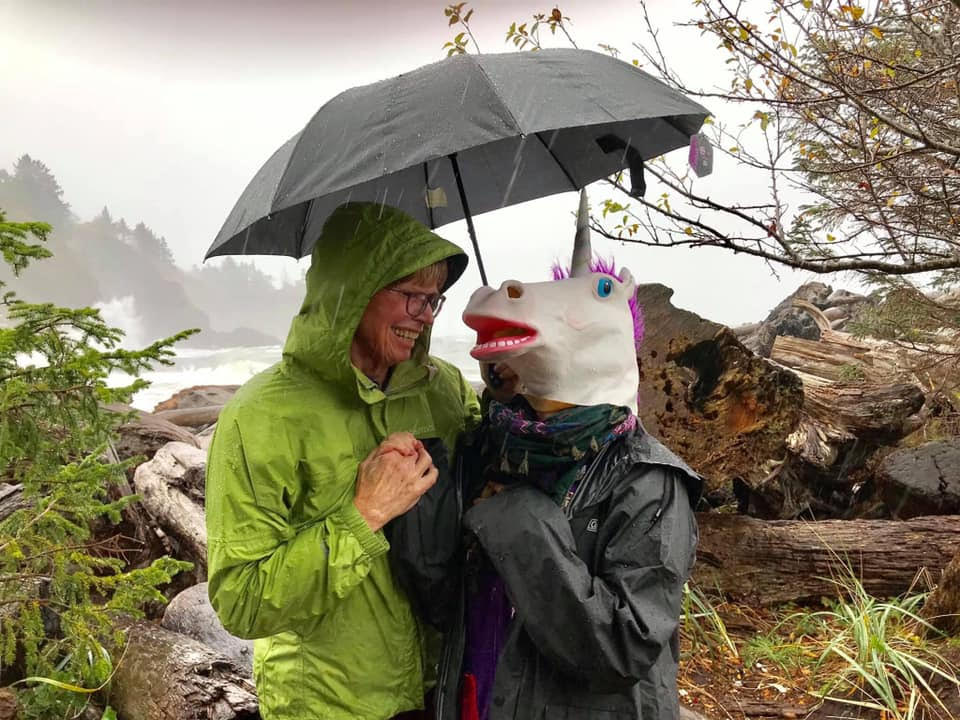By Mary Jo Klinker
On May 20, 2021, JamieAnn, one of my dearest friends and a rural radical bi transcestor, passed away. It was an honor to witness and learn from her gorgeous openness, her gifts of knowledge, and her unbridled queer eccentricity. She was a bi troublemaker. At the start of the pandemic, she learned of her ALS diagnosis. We sat down and started recording her life. Trans and queer liberation were her life praxis. Some of these lessons I felt were critical to archive for this Bi+ History discussion.
She was covered in geological-themed tattoos of her life journeys. When we met in 2013, she was a retired professor of geology, and she was the first faculty member to transition (and very likely the first out Bi+ faculty member). During her time teaching, she fought to make so much possible for future LGBTQIA+ faculty, staff, and students. This was her ethic of care. In Hil Malatino’s 2020 Trans Care, he examines the importance of such collective care ethics in ensuring liberation, stating: “This is about a certain kind of faithfulness and certain kind of obligation: about what we owe each other…a commitment to showing up for all of those folks engaged in the necessary and integral care work that supports trans lives.” (Malatino 72) Some of these stories only brush the surface of how she committed to that care as a bi transcestor.
Our first presentation together was in 2015 for the BECAUSE Conference hosted by the Bisexual Organizing Project, a presentation we called “Out in the Corn” about building bi-inclusive and pleasure-affirming rural queer community. We bemoaned how hard it was to find other bi+ femmes and offered space for intergenerational storytelling. JamieAnn WAS my rural queer community. We published our conference discussion in the Bi Women Quarterly. That discussion turned into our shared passion to use our platforms to teach social change. We built two classes together at the university for senior community members on LGBTQIA+ identities. JamieAnn’s aims were clear the first day of every class: she wanted to make sure that elders in our community could protect LGBTQIA+ youth fiercely, so they could survive and thrive in ways her generation had been denied.
JamieAnn saved so many lives with trans care and by being authentically herself. For instance, her solo performance of “First Person: A Life in Transition” in 2016 in our rural town made LGBTQIA+ students felt safe to share their stories and met an elder doing art for social change. She also dedicated much of her retirement to building bridges in faith communities, by offering personal stories and inviting conversation to create safer spaces. All of these are examples of her promise to building bi and trans safety.
In documenting these life stories, I asked her, if, like gender and sexuality (which she always described as a spectrum), she appreciated the spectrum of her life experiences. She responded by explaining a queer scientific metaphor: “I’ve talked about braided streams and I have struggled understanding the water itself, it’s one water but it flows in different channels. They join and they separate. They join and they separate.” She went on to explain that fusing “together all of the rivers that run through my mind (and body)” never felt possible because of people who think in rigid boundaries and binaries. She shared photo albums of her geological research days, and through this metaphor, she taught me about the Snake River in Grand Teton National Park and the story that shifting rocks told her about the changes in our environmental world. Changes that she said offered her ways to reflect on her life, claiming pride in herself and community. When we talked about the end of life, she approached it with such wisdom. She shared, “Heaven to me is being remembered as a good teacher, and maybe as the first trans person someone met, that made it possible for them to accept us.”
Near the end, we went on journeys to drink lattes covered in rainbow sprinkles. She would tell the young baristas, “I need the drink to look really queer!” And at the end of her last autumn, we wept in the car when we saw the last of the great blue herons on the Mississippi River.
In the fall of 2021, a group of us in our rural town hosted our first Drag Story Hour. JamieAnn was one of the first donors to make it happen and never lived to see it. In many ways, the event was in honor of her labors for queer community and safety. She provided for bi+ and trans community endlessly; she would want us to use all this history to protect trans and bi+ youth and to fight hard as fuck for this world. She certainly did.
Work Cited: Malatino, Hil. Trans Care. University of Minnesota Press, 2020.
Mary Jo Klinker is a scholar-activist of Women’s, Gender, and Sexuality Studies at Winona State University.

